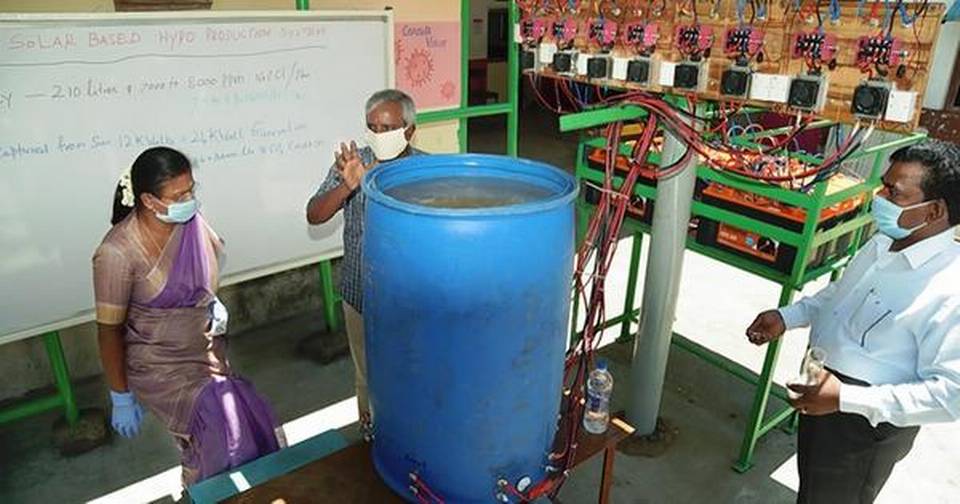
R. Elango, a former scientist at Council of Scientific and Industrial Research (CSIR), shows how to make sodium hypochlorite using solar power.
R. Elango, a former scientist at Council of Scientific and Industrial Research (CSIR), who later served as the president of Kuthambakkam panchayat in Tiruvallur district, has come up with a design to manufacture sodium hypochlorite using solar power in a decentralised manner.
Considering that sodium hypochlorite is the disinfectant widely used in various concentrations depending on the purpose, he says the design can be used to meet the current surge in demand for the disinfectant in the fight against COVID-19.
“Right from floor cleaners and toilet cleaners to sprays used widely now for disinfecting public places is sodium hypochlorite, which is the mother of all disinfectants. It is commonly manufactured in industries through electrolysis,” he says. Explaining the process, Mr. Elango, who is a chemical engineer by qualification, says sodium hypochlorite is made in industries by the simple process of passing electricity through titanium electrodes immersed in sodium chloride (salt) solution.
High demand for disinfectants
Mr. Elango replaced the conventional source of electricity with a 1 kilowatt capacity solar panel. With the high demand for disinfectants, he highlights that the conservation of non-renewable power would be huge.
“In a barrel fitted with the electrodes, one has to fill salt water solution in high concentration and pass the solar-generated power. In about eight hours, you can get sodium hypochlorite from a tap attached to the barrel.” For now, he has designed the unit in two different capacities of a 25-litre barrel and a 210-litre barrel. 25 litres of sodium hypochlorite can be diluted to 100 litres for disinfecting drainages, to 150 litres for floor cleaning and to 500 litres for applications like cleaning utensils, he claims.
These units can be easily set up in open at the village or town-level to meet the local demand. “It is a completely safe process. The electricity used is of very low voltage. There is absolutely no byproduct or other waste that needs to be handled,” he says.
Steep initial costs
According to him, while the 25-litre capacity unit will cost about ₹ 60,000 to set up, the 210-litre capacity will cost around four to five times more. V.P. Jayakumar, managing director of Tiaano, a chemical company, who helped Mr. Elango in assembling the electrodes in the unit, said excluding the initial cost to set up the unit, one litre of sodium hypochlorite can be produced at a cost of 0.05 paise. “This is inclusive of employing a person for ₹500 per day. The input will just be 750 g of salt in 25 l of water for one cycle.”
“Floor cleaners we buy from supermarkets cost around ₹85 for just 300 ml,” he adds. Mr. Elango says it can also become a business model for villages to generate revenue. Mageswari Ravikumar, Collector, Tiruvallur, who inspected the design, says the district would soon set up a unit on an experimental basis.
source: http://www.thehindu.com / The Hindu / Home> News> Cities> Chennai / by Pon Vasanth B.A / Chennai – April 21st, 2020